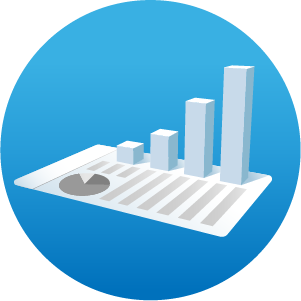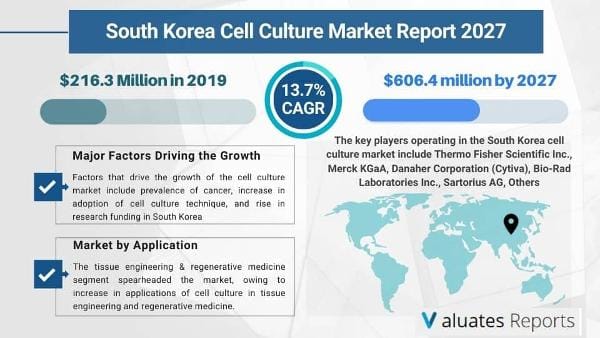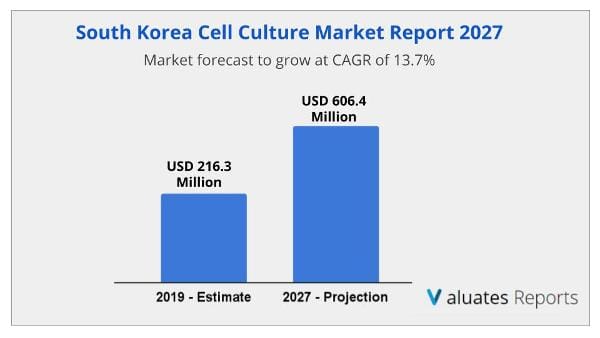
The South Korea cell culture market size was valued at $216.3 million in 2019 and is projected to reach $606.4 million by 2027, registering a CAGR of 13.7% from 2020 to 2027. COVID-19 outbreak has considerable impact on South Korea. Increase in cases of COVID-19 in the country has fueled the need of vaccines, which resulted in many R&Ds, thereby boosting the demand for cell culture products. Thus, this is expected to support the market growth over the forecast period.

Cell culture refers to the culture of nucleated (eukaryotic) cells under controlled conditions within the laboratory. In this process, cells are removed from the organism and introduced into an artificial environment with favorable conditions. Moreover, this artificial environment is composed of all the necessary nutrients such as ideal temperature, gases, pH, and humidity, which are essential for the growth and proliferation of the cells. Removal of cells from the tissues can be carried out either by mechanical or enzymatic method before cultivation. The cells to be grown can also be derived from a cell line or cell strain that has already been established.
Different types of tools and machines are employed in the production of cell culture. These machines are known as instruments. Furthermore, different types of chemicals are also employed in the production of a cell culture. These chemicals are also known as consumables, as are completely consumed in the process. Culture condition required for cell culture includes substrate or medium, growth factors, hormones, gases, and regulated physico-chemical environment.
Factors that drive the growth of the cell culture market include prevalence of cancer, increase in adoption of cell culture technique, and rise in research funding in South Korea. For instance, according to the report published by National Cancer Center Korea, cancer is the most common cause of death in Korea as well as it is responsible for one out of every three deaths in the country. In 2016, the number of cancer cases in the country was 231,236, which was increased to 232,255 in 2017. Different key players offer cell culture products that are consistently used for cancer research. For instance, key players such as Thermo Fisher Scientific Inc. offer cancer cytogenetic media and heat stable recombinant human basic fibroblast growth factor (bFGF), which are used while performing wound healing assays, or scratch assays, to determine the migratory potential of cancer cells.

However, high capital investment and lack of infrastructure for cell-based research are anticipated to restrain the South Korea cell culture market growth during the forecast period.
On the contrary, expected rise in demand for advanced technologies is likely to create ample opportunities for the market growth in the near future.
The World Health Organization (WHO) on January 30, 2020, declared COVID-19 outbreak a public health emergency of international concern. For instance, according to the Korea Centers for Disease Control and Prevention (KCDC), in March 2021, the number of coronavirus-infected people has increased to 7,382 in South Korea, with a total of 51 deaths from the COVID-19 registered in the country. Furthermore, rise in demand for cell culture product due to the pandemic has been witnessed. In addition, increase in number of cases of COVID-19 drives the need for vaccines, which leads to research and development as vaccines are in clinical trial. Therefore, there is a requirement of cell line and different cell culture techniques used in COVID-19. In addition, researchers are trying to understand the disease at a molecular level to develop therapeutic interventions. However, primary cells are excellent models for studying respiratory diseases. Primary cell culture offers the opportunity to understand lung disease mechanisms at a cellular level and to specifically target pathogenic processes using therapeutic compounds during COVID-19 pandemic. Thus, COVID-19 is expected to boost the demand for cell culture market in the near future.
The South Korea cell culture market is categorized into product, application, and end user. On the basis of product, the market is segmented into consumables and instruments. The consumables segment is further divided into sera, media, reagents, and bioreactor accessories. The instrument segment is additionally sub-segmented into bioreactors, cell culture vessels, cell culture storage equipment, and cell culture supporting instruments. The consumables segment dominated the market in terms of revenue in 2019, owing to higher consumption of cell culture consumables along with repeated purchase of cell culture consumables as compared to cell culture instruments.
On the basis of application, the South Korea cell culture market is classified into stem cell technology, cancer research, drug screening and development, tissue engineering & regenerative medicine, and others. The tissue engineering & regenerative medicine segment spearheaded the market, owing to increase in applications of cell culture in tissue engineering and regenerative medicine.
On the basis of end user, the South Korea cell culture market is divided into research institutes, pharmaceutical & biotechnology companies, and others. The pharmaceutical & biotechnology companies segment is expected to dominate the market throughout the forecast period, owing to expansion of major pharmaceutical companies and growing regulatory approvals for the production of cell culture-based vaccines.
The key players operating in the South Korea cell culture market include Thermo Fisher Scientific Inc., Merck KGaA, Danaher Corporation (Cytiva), Bio-Rad Laboratories Inc., Sartorius AG, FUJIFILM Holdings Corporation (FUJIFILM Irvine Scientific, Inc.), Corning Incorporated, Avantor, Inc. (VWR International, LLC), Miltenyi Biotec B.V. & Co. KG, and STEMCELL Technologies Inc. The cell culture market is competitive in nature, as major players in this vertical are concentrating on growth strategies such product launch, operational expansion, acquisition, partnership, and collaboration to attain competitive edge in the market.
For instance, in April 2020, Danaher Corporation launched Cytiva in South Korea, which aims to completely rebrand the GE (General Electric’s) Healthcare LifeScience.
By Product
By Application
By End User
TABLE OF CONTENT
CHAPTER 1:INTRODUCTION
1.1.Report description
1.2.Key market segments
1.2.1.List of key players profiled in the report
1.3.Research methodology
1.3.1.Primary research
1.3.2.Secondary research
1.3.3.Analyst tools and models
CHAPTER 2:EXECUTIVE SUMMARY
2.1.Key findings of the study
2.2.CXO perspective
CHAPTER 3:MARKET OVERVIEW
3.1.Market definition and scope
3.1.1.Top investment pockets
3.1.2.Top winning strategies
3.2.Porter's five forces analysis
3.3.Market dynamics
3.3.1.Drivers
3.3.1.1.Prevalence of cancer
3.3.1.2.Increase in adoption of cell culture technique
3.3.1.3.Increase in research funding
3.3.2.Restraints
3.3.2.1.High capital investment
3.3.2.2.Lack of infrastructure for cell-based research
3.3.3.Opportunity
3.3.3.1.Expected rise in demand for advanced technologies
3.3.4.Impact analysis
3.4.Market share analysis (South Korea culture media market, 2019)
3.5.Impact analysis of COVID-19 on the cell culture market
CHAPTER 4:SOUTH KOREA CELL CULTURE MARKET, BY PRODUCT
4.1.Overview
4.1.1.Market size and forecast
4.2.Consumables
4.2.1.Market size and forecast
4.2.1.1.Sera
4.2.2.Market size and forecast
4.2.2.1.Media
4.2.3.Market size and forecast
4.2.3.1.Reagents
4.2.4.Market size and forecast
4.2.4.1.Bioreactor accessories
4.2.5.Market size and forecast
4.3.Instruments
4.3.1.Market size and forecast
4.3.1.1.Bioreactors
4.3.2.Market size and forecast
4.3.2.1.Cell culture vessels
4.3.3.Market size and forecast
4.3.3.1.Cell culture storage equipment
4.3.4.Market size and forecast
4.3.4.1.Cell culture supporting instruments
4.3.5.Market size and forecast
CHAPTER 5:SOUTH KOREA CELL CULTURE MARKET, BY APPLICATION
5.1.Overview
5.1.1.Market size and forecast
5.2.Stem cell technology
5.2.1.Market size and forecast
5.3.Cancer research
5.3.1.Market size and forecast
5.4.Drug screening and development
5.4.1.Market size and forecast
5.5.Tissue engineering & regenerative medicine
5.5.1.Market size and forecast
5.6.Others
5.6.1.Market size and forecast
CHAPTER 6:SOUTH KOREA CELL CULTURE MARKET, BY END USER
6.1.Overview
6.1.1.Market size and forecast
6.2.Research institutes
6.2.1.Market size and forecast
6.3.Pharmaceutical & biotechnology companies
6.3.1.Market size and forecast
6.4.Others
6.4.1.Market size and forecast
CHAPTER 7:COMPANY PROFILES
7.1.AVANTOR, INC. (VWR INTERNATIONAL, LLC)
7.1.1.Company overview
7.1.2.Company snapshot
7.1.3.Operating business segments
7.1.4.Product portfolio
7.1.5.Business performance
7.2.BIO-RAD LABORATORIES INC.
7.2.1.Company overview
7.2.2.Company snapshot
7.2.3.Operating business segments
7.2.4.Product portfolio
7.2.5.Business performance
7.2.6.Key strategic moves and developments
7.3.CORNING INCORPORATED
7.3.1.Company overview
7.3.2.Company snapshot
7.3.3.Operating business segments
7.3.4.Product portfolio
7.3.5.Business performance
7.3.6.Key strategic moves and developments
7.4.DANAHER CORPORATION (CYTIVA)
7.4.1.Company overview
7.4.2.Company snapshot
7.4.3.Operating business segments
7.4.4.Product portfolio
7.4.5.Business performance
7.4.6.Key strategic moves and developments
7.5.FUJIFILM HOLDINGS CORPORATION (FUJIFILM IRVINE SCIENTIFIC, INC.)
7.5.1.Company overview
7.5.2.Company snapshot
7.5.3.Operating business segments
7.5.4.Product portfolio
7.5.5.Business performance
7.5.6.Key strategic moves and developments
7.6.MERCK KGAA
7.6.1.Company overview
7.6.2.Company snapshot
7.6.3.Operating business segments
7.6.4.Product portfolio
7.6.5.Business performance
7.6.6.Key strategic moves and developments
7.7.MILTENYI BIOTEC B.V. & CO. KG
7.7.1.Company overview
7.7.2.Company snapshot
7.7.3.Operating business segments
7.7.4.Product portfolio
7.7.5.Key strategic moves and developments
7.8.SARTORIUS AG
7.8.1.Company overview
7.8.2.Company snapshot
7.8.3.Operating business segments
7.8.4.Product portfolio
7.8.5.Business performance
7.8.6.Key strategic moves and developments
7.9.STEMCELL TECHNOLOGIES INC.
7.9.1.Company overview
7.9.2.Company snapshot
7.9.3.Operating business segments
7.9.4.Product portfolio
7.9.5.Key strategic moves and developments
7.10.THERMO FISHER SCIENTIFIC, INC.
7.10.1.Company overview
7.10.2.Company snapshot
7.10.3.Operating business segments
7.10.4.Product portfolio
7.10.5.Business performance
7.10.6.Key strategic moves and developments
LIST OF TABLES & FIGURES
TABLE 01.SOUTH KOREA CELL CULTURE MARKET, BY PRODUCT, 2019-2027 ($MILLION)
TABLE 02.SOUTH KOREA CELL CULTURE MARKET, BY CONSUMABLES, 2019-2027 ($MILLION)
TABLE 03.SOUTH KOREA CELL CULTURE MARKET, BY INSTRUMENTS, 2019-2027 ($MILLION)
TABLE 04.SOUTH KOREA CELL CULTURE MARKET, BY APPLICATION, 2019-2027 ($MILLION)
TABLE 05.SOUTH KOREA CELL CULTURE MARKET, BY END USER, 2019-2027 ($MILLION)
TABLE 06.AVANTOR: COMPANY SNAPSHOT
TABLE 07.AVANTOR: OPERATING SEGMENTS
TABLE 08.AVANTOR: PRODUCT PORTFOLIO
TABLE 09.BIO-RAD: COMPANY SNAPSHOT
TABLE 10.BIO-RAD: OPERATING SEGMENTS
TABLE 11.BIO-RAD: PRODUCT PORTFOLIO
TABLE 12.CORNING: COMPANY SNAPSHOT
TABLE 13.CORNING: OPERATING SEGMENT
TABLE 14.CORNING: PRODUCT PORTFOLIO
TABLE 15.CORNING: KEY STRATEGIC MOVES AND DEVELOPMENTS
TABLE 16.DANAHER: COMPANY SNAPSHOT
TABLE 17.DANAHER: OPERATING SEGMENTS
TABLE 18.DANAHER: PRODUCT PORTFOLIO
TABLE 19.DANAHER CORPORATION: KEY STRATEGIC MOVES AND DEVELOPMENTS
TABLE 20.FUJIFILM: COMPANY SNAPSHOT
TABLE 21.FUJIFILM: OPERATING SEGMENTS
TABLE 22.FUJIFILM: PRODUCT PORTFOLIO
TABLE 23.MERCK: COMPANY SNAPSHOT
TABLE 24.MERCK: OPERATING SEGMENTS
TABLE 25.MERCK: PRODUCT PORTFOLIO
TABLE 26.MERCK: KEY STRATEGIC MOVES AND DEVELOPMENTS
TABLE 27.MILTENYI BIOTEC: COMPANY SNAPSHOT
TABLE 28.MILTENYI BIOTEC: OPERATING SEGMENT
TABLE 29.MILTENYI BIOTEC: PRODUCT PORTFOLIO
TABLE 30.MILTENYI BIOTEC: KEY STRATEGIC MOVES AND DEVELOPMENTS
TABLE 31.SARTORIUS: COMPANY SNAPSHOT
TABLE 32.SARTORIUS: OPERATING BUSINESS SEGMENTS
TABLE 33.SARTORIUS: PRODUCT PORTFOLIO
TABLE 34.SARTORIUS: KEY STRATEGIC MOVES AND DEVELOPMENTS
TABLE 35.STEMCELL: COMPANY SNAPSHOT
TABLE 36.STEMCELL: OPERATING SEGMENT
TABLE 37.STEMCELL: PRODUCT PORTFOLIO
TABLE 38.STEMCELL: KEY STRATEGIC MOVES AND DEVELOPMENTS
TABLE 39.THERMO FISHER: COMPANY SNAPSHOT
TABLE 40.THERMO FISHER.: OPERATING SEGMENTS
TABLE 41.THERMO FISHER.: PRODUCT PORTFOLIO
TABLE 42.THERMO FISHER: KEY STRATEGIC MOVES AND DEVELOPMENTS
LIST OF FIGURES
FIGURE 01.SOUTH KOREA CELL CULTURE MARKET SEGMENTATION
FIGURE 02.TOP INVESTMENT POCKETS
FIGURE 03.TOP WINNING STRATEGIES, BY YEAR, 2018–2021
FIGURE 04.TOP WINNING STRATEGIES, BY DEVELOPMENT, 2018–2021 (%)
FIGURE 05.TOP WINNING STRATEGIES, BY COMPANY, 2018–2021
FIGURE 06.HIGH BARGAINING POWER OF SUPPLIER
FIGURE 07.MODERATE BARGAINING POWER OF BUYERS
FIGURE 08.HIGH THREAT OF SUBSTITUTES
FIGURE 09.MODERATE INTENSITY OF RIVALRY
FIGURE 10.LOW THREAT OF NEW ENTRANT
FIGURE 11.IMPACT ANALYSIS
FIGURE 12.MARKET SHARE ANALYSIS (SOUTH KOREA CULTURE MEDIA MARKET, 2019)
FIGURE 13.SOUTH KOREA CELL CULTURE MARKET FOR SERA, 2019-2027 ($MILLION)
FIGURE 14.SOUTH KOREA CELL CULTURE MARKET FOR MEDIA, 2019-2027 ($MILLION)
FIGURE 15.SOUTH KOREA CELL CULTURE MARKET FOR REAGENTS, 2019-2027 ($MILLION)
FIGURE 16.SOUTH KOREA CELL CULTURE MARKET FOR BIOREACTOR ACCESSORIES, 2019-2027 ($MILLION)
FIGURE 17.SOUTH KOREA CELL CULTURE MARKET FOR BIOREACTORS, 2019-2027 ($MILLION)
FIGURE 18.SOUTH KOREA CELL CULTURE MARKET FOR CELL CULTURE VESSELS, 2019-2027 ($MILLION)
FIGURE 19.SOUTH KOREA CELL CULTURE MARKET FOR CELL CULTURE STORAGE EQUIPMENT, 2019-2027 ($MILLION)
FIGURE 20.SOUTH KOREA CELL CULTURE MARKET FOR CELL CULTURE SUPPORTING INSTRUMENTS,
2019-2027 ($MILLION)
FIGURE 21.SOUTH KOREA CELL CULTURE MARKET FOR STEM CELL TECHNOLOGY, 2019-2027 ($MILLION)
FIGURE 22.SOUTH KOREA CELL CULTURE MARKET FOR CANCER RESEARCH, 2019-2027 ($MILLION)
FIGURE 23.SOUTH KOREA CELL CULTURE MARKET FOR DRUG SCREENING AND DEVELOPMENT, 2019-2027 ($MILLION)
FIGURE 24.SOUTH KOREA CELL CULTURE MARKET FOR TISSUE ENGINEERING & REGENERATIVE MEDICINE, 2019-2027 ($MILLION)
FIGURE 25.SOUTH KOREA CELL CULTURE MARKET FOR OTHERS, 2019-2027 ($MILLION)
FIGURE 26.SOUTH KOREA CELL CULTURE MARKET FOR RESEARCH INSTITUTES, 2019-2027 ($MILLION)
FIGURE 27.SOUTH KOREA CELL CULTURE MARKET FOR PHARMACEUTICAL & BIOTECHNOLOGY COMPANIES, 2019-2027 ($MILLION)
FIGURE 28.SOUTH KOREA CELL CULTURE MARKET FOR OTHERS, 2019-2027 ($MILLION)
FIGURE 29.AVANTOR: NET SALES, 2017–2019 ($MILLION)
FIGURE 30.AVANTOR: REVENUE SHARE BY SEGMENT, 2019 (%)
FIGURE 31.AVANTOR: REVENUE SHARE BY REGION, 2019 (%)
FIGURE 32.BIO-RAD: NET SALES, 2017–2019 ($MILLION)
FIGURE 33.BIO-RAD: REVENUE SHARE BY SEGMENT, 2019 (%)
FIGURE 34.BIO-RAD: REVENUE SHARE BY REGION, 2019 (%)
FIGURE 35.CORNING: NET SALES, 2017–2019 ($MILLION)
FIGURE 36.CORNING: REVENUE SHARE, BY SEGMENT, 2019 (%)
FIGURE 37.CORNING: REVENUE SHARE, BY REGION, 2019 (%)
FIGURE 38.DANAHER: NET SALES, 2017–2019 ($MILLION)
FIGURE 39.DANAHER: REVENUE SHARE BY SEGMENT, 2019 (%)
FIGURE 40.DANAHER: REVENUE SHARE BY REGION, 2019 (%)
FIGURE 41.FUJIFILM: NET SALES, 2017–2019 ($MILLION)
FIGURE 42.FUJIFILM: REVENUE SHARE BY SEGMENT, 2019 (%)
FIGURE 43.FUJIFILM: REVENUE SHARE, BY REGION, 2019 (%)
FIGURE 44.MERCK: NET SALES, 2017–2019 ($MILLION)
FIGURE 45.MERCK: REVENUE SHARE, BY SEGMENT, 2019 (%)
FIGURE 46.MERCK: REVENUE SHARE, BY REGION, 2019 (%)
FIGURE 47.SARTORIUS: NET SALES, 2017–2019 ($MILLION)
FIGURE 48.SARTORIUS: REVENUE SHARE BY SEGMENT, 2019 (%)
FIGURE 49.SARTORIUS: REVENUE SHARE BY REGION, 2019 (%)
FIGURE 50.THERMO FISHER: NET SALES, 2017–2019 ($MILLION)
FIGURE 51.THERMO FISHER: REVENUE SHARE, BY SEGMENT, 2019 (%)
FIGURE 52.THERMO FISHER: REVENUE SHARE, BY REGION, 2019 (%)
$3179
$4657
HAVE A QUERY?
OUR CUSTOMER

SIMILAR REPORTS